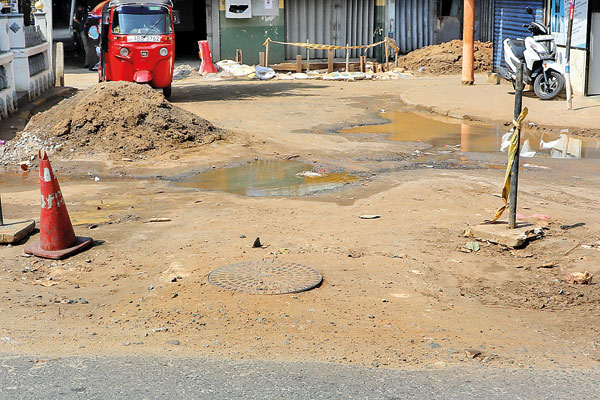News
Wake up call for importance of safety gear as 2 CMC workers die working on sewer line
View(s):By Nadia Fazlulhaq
Health and safety experts have stressed the importance of using safety gear during any work related to sewage/drain lines and any other underground maintenance work.
This week, two Colombo Municipal Council (CMC) workers died after they were involved in work related to connecting a new sewerage line in Kotahena area. One worker had lost consciousness when entering the pit and the other died trying to save his fellow worker. CMC’s fire fighters took them out of the pit and rushed them to the National Hospital. However, they were both declared dead on admission.
Residents in the area believe the two workers– a 22-year- old and a 38-year-old would have died following exposure to toxic gas.
Police Spokesman SSP Nihal Thalduwa told the Sunday Times that an open verdict was given and samples obtained from the bodies have been sent to the Government Analyst Department.

Scene of the tragedy. Pic by M.A.Pushpa Kumara
The gas that is commonly found in drainage lines and can be lethal is hydrogen sulfide (H2S), Head of the National Poison Information Centre Dr.Ravi Jayawardena said.
“Hydrogen sulfide is a colourless gas with a strong odour of rotten eggs. It is produced by the breakdown of organic matter in the absence of oxygen, which can occur in sewer lines and other areas where there is stagnant water or sewage. In high concentrations, hydrogen sulfide can cause respiratory distress, nausea, headaches, dizziness and loss of consciousness. In extreme cases, it can lead to death,” he said.
Methane, Carbon monoxide (CO), and Ammonia (NH3) are also sometimes present in sewer and drainage systems.
Commenting on safety standards for workers Dr. Jayawardena stressed that it was important to have an emergency plan, including evacuatuon and first aid in place in case of an accident or exposure to hazardous gases, including plan for evacuation and first aid.
“Before entering a drainage line, workers should conduct air monitoring and testing to identify the presence of any hazardous gases, such as hydrogen sulfide or methane,” he added.
Health Ministry’s Occupational Health Division Director, Dr.V.T.S.K. Siriwardena, said the use of personal protective equipment such as gloves, boots, and respirators is ignored in some instances though guidelines are in place.
“Local councils should pay more attention to investing in PPEs (Personal Protective Equipment). Even casual workers need to be trained on the use of this equipment when at work,” he said.
CMC’s Director of Engineering (Water Supply and Drainage) Eng. R.A.T.P. Ranawaka said instructions have been given to workers regarding safety precautions, especially when laying a new sewerage line.
“CMC has been working on sewerage lines deeper than this. Based on the proper cause of death, action will be taken to prevent such incidents,” he said.
The best way to say that you found the home of your dreams is by finding it on Hitad.lk. We have listings for apartments for sale or rent in Sri Lanka, no matter what locale you're looking for! Whether you live in Colombo, Galle, Kandy, Matara, Jaffna and more - we've got them all!

